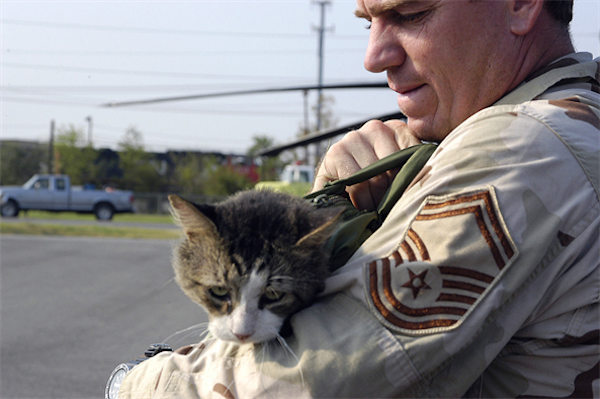As a pet owner, sometimes I have terrible nightmares about animals in strife.
The animals aren’t always the same, but there’s a narrative pattern: something horrible happens, and I’m struggling to rescue them, whether from the jaws of a predator or a sea’s angry waves.
I think I can guess what a therapist would tell me. Probably something about my need to be in control of vulnerable parts of life and myself—pretty good, right? But when real-life natural disasters arise, I’m reminded that dreams aren’t just patchworks of the subconscious: they are an echo of reality. We are all at the whim of nature’s wrath or mercy in some respects, just like the animals in my dreams. But in so many ways, animals are at the whim of our actions too—and not just when disaster strikes.
When Harvey slammed Texas, and Irma hit the islands and southeastern coast of the United States, it was a reminder to Americans that life as usual can be uprooted in an instant. Luckily, the response has been overwhelming, both for the people and animals affected. Hundreds of millions of dollars have been donated to many forms of disaster relief. This includes charities like The Red Cross and, to a lesser extent, animal-specific organizations like The American Humane Society.
It goes without saying that human victims are, and have been the main priority, and for good reason: families lost 40,000 homes to Harvey, while Irma destroyed a quarter of all homes in the Florida Keys alone. Not long after, Hurricane Maria destroyed hundreds of homes in Puerto Rico and the Dominican Republic, where power could be out for months. The result is devastating for the victims, especially the disproportionately-affected poor.
In addition, thousands of pets are still displaced or missing with shelters overflowing. These creatures have no means or voice to help themselves. Are we doing enough to help them now? Are we ever?
We know now more than ever that disaster plans need to include pets and animals—and that most owners consider pets part of the family. When Hurricane Katrina hit, “44 percent of people who chose not to evacuate did so because they did not want to abandon their pets,” The Washington Post reported, which led to the Pets Evacuation and Transportation Standards Act. Zoos and shelters have learned from past storms too, developing better processes and protections to weather out even the worst of storms when evacuation isn’t possible.
Animals, like people, need help in the wake of disasters, and efforts that follow should be praised to the high hills. A student in Puerto Rico sheltered 90 birds from the hurricane in her own home. In Juchitán, Mexico, ravaged by an earthquake, the Humane Society International team set up an emergency clinic to provide treatment for 1,350 animals, mostly cats and dogs (and one parrot).
Legislation, donations, on-the-ground acts of kindness that follow disaster show humanity at its best. But the vulnerable don’t just need us to care after the storm. They need us to care all of the time. Our obligation doesn’t disappear along with the clouds and the wreckage.
A woman once told me that stray cats can sense hurricanes before they come. When Hurricane Sandy hit New York, they found high ground, sensing the storm’s vibrations before the meteorologists did. I don’t know if that’s true, but it speaks to a sixth sense many creatures have with nature and the weather. But if you are responsible for that cat and it can’t find high ground on its own, the job falls to you—sixth sense or not.
This responsibility means not just finding high ground and taking those we can with us, but working to help animals at all times. If you want to support a shelter and foster a pet that’s been displaced by tropical storms, that’s wonderful. If you can’t, keep in mind that there will always be pets in need to adopt, and charities in need of funding. It’s not our obligation to give a home to every shelter animal, but if many of us contribute a small amount, it accumulates into a powerful gust of goodwill.
The goodwill inspired by disaster is a bittersweet salve, and a reminder that our hearts are large, and our actions are capable of making a difference. There’s more we can do if we zoom out and look at the bigger picture when the satellite clears. We can help make sure animal sanctuaries are safe, and that natural habitats are protected year-round. We can make small lifestyle changes to treat the environment and planet with respect. We can speak out about climate change, a factor that causes severe weather events like those we’ve been seeing.
For animals, humanity can either be a hurricane or a safe harbor; a nightmare or a blissful day in the park. And seeing all that these creatures provide us with—food, companionship, joy, a stable ecosystem, even pest control—we owe them, at the very least, some common decency. We’ve conditioned an unconditional love from our animals that stems from the dependency many of them have on us for survival.
We are powerful enough to make a difference.
~
~
Author: Devorah Rose
Image: Air Force Reserve Command
Editor: Callie Rushton
Copy Editor: Travis May
Social Editor: Waylon Lewis


 Share on bsky
Share on bsky





Read 0 comments and reply